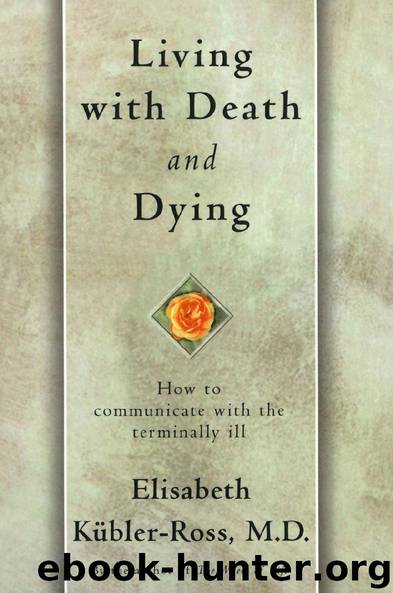Living with Death and Dying by Elisabeth Kübler-Ross M.D

Author:Elisabeth Kübler-Ross, M.D.
Language: eng
Format: epub
Publisher: Simon and Schuster
Published: 1981-07-15T00:00:00+00:00
III
PARENT CARE: TOTAL INVOLVEMENT IN THE CARE OF A DYING CHILD
BY MARTHA PEARSE ELLIOTT
I THOUGHT that it would be worse than it was. I thought that losing a child to leukemia was the ultimate in tragedy.
The loss and the tragedy cannot be denied. And the nineteen months between diagnosis and death certainly weren’t easy. But they weren’t as hard as I thought they would be.
Meredith was six when she died in January 1973, in a Houston hospital six hundred miles from our Kansas home. It had been a long time since we first walked through those doors in the dark of night, afraid and alone, in a strange place.
But the people, the doctors, the institution that shaped our lives during that time gave us the perspective that made her death more acceptable than it might have been in another setting.
Thanatology, the study of death and dying, is a fashionable topic today, with researchers such as Elisabeth Kübler-Ross helping society to cast off some of its taboos about the dying.
Personal experience taught me and my family many of the same concepts discovered through detailed research. Among these are that death is not necessarily totally negative, and that each of us, whether we are dying ourselves or comforting someone else who is dying, has resources to call upon to enrich the time that is left and to accept the end with some modicum of grace.
My own resources were not just the ones I expected. Fortunately, there were some basic essentials: Jerry, my husband; Hunter, my twelve-year-old son; Meredith, the stricken child, who had unusual perception and maturity; and my own ability to function reasonably well under stress.
Three other factors, though, were instrumental in shaping the experience. They were the availability of a parent-care pediatric ward, a hospital subculture of helping mothers, and a supportive and empathetic friend.
The parent-care ward was the most significant. Once I discovered the difference between an ordinary hospital situation and a specialized center that emphasizes full parent involvement as well as aggressive medical care, I was willing to take extraordinary measures to be a part of the latter.
Parent-care pediatric units are few and far between, mostly at medical centers that specialize in catastrophic diseases of children. Obviously, few hospitals are geared toward long-term care, so extensive parent involvement is not practical.
But many care centers do exist where parents could be more involved then they are. The arguments for keeping parents out of the picture are many. Physicians feel parents are better off not knowing everything, nurses feel parents are in the way and do more harm than good, administrators may feel the extra cost of maintaining facilities for parents is not only unjustifiable but akin to running a hotel—there are many other logical reasons why traditional care should prevail. Logical, but not necessarily helpful.
Parent care is not altogether efficient. It involves risks, personal conflicts, and bothersome routines that medical personnel easily could live without. But in a well-managed unit, parents actually relieve the staff of many duties that in turn reduce the cost of extra salaries.
Download
This site does not store any files on its server. We only index and link to content provided by other sites. Please contact the content providers to delete copyright contents if any and email us, we'll remove relevant links or contents immediately.
Hit Refresh by Satya Nadella(9132)
When Breath Becomes Air by Paul Kalanithi(8442)
The Girl Without a Voice by Casey Watson(7888)
A Court of Wings and Ruin by Sarah J. Maas(7845)
Do No Harm Stories of Life, Death and Brain Surgery by Henry Marsh(6941)
Shoe Dog by Phil Knight(5267)
The Rules Do Not Apply by Ariel Levy(4969)
A Higher Loyalty: Truth, Lies, and Leadership by James Comey(4962)
Hunger by Roxane Gay(4927)
Tuesdays with Morrie by Mitch Albom(4784)
Everything Happens for a Reason by Kate Bowler(4743)
The Immortal Life of Henrietta Lacks by Rebecca Skloot(4587)
Millionaire: The Philanderer, Gambler, and Duelist Who Invented Modern Finance by Janet Gleeson(4478)
How to Change Your Mind by Michael Pollan(4356)
All Creatures Great and Small by James Herriot(4321)
The Money Culture by Michael Lewis(4207)
Man and His Symbols by Carl Gustav Jung(4135)
Elon Musk by Ashlee Vance(4127)
Tokyo Vice: An American Reporter on the Police Beat in Japan by Jake Adelstein(3996)
